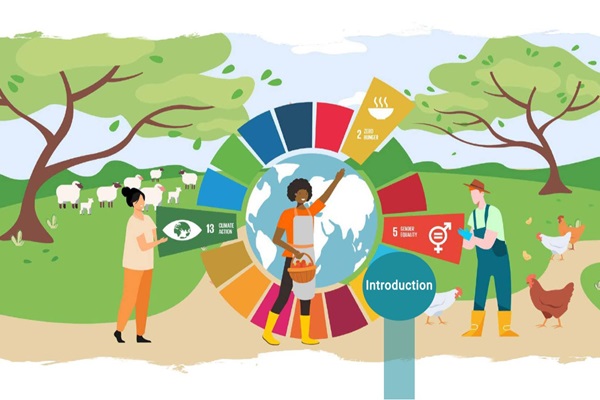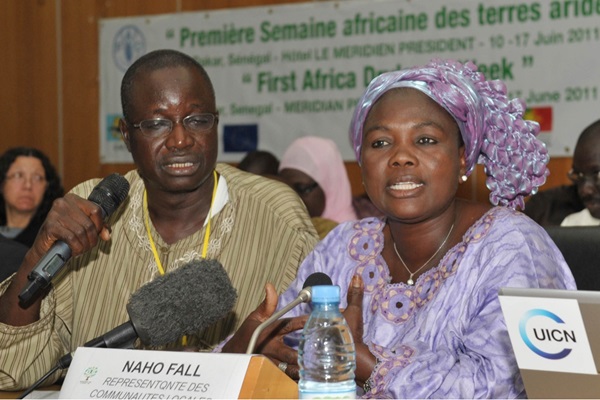We cannot end hunger and poverty without empowering both men and women in agrifood systems.
Today, agriculture and food systems face an unprecedented array of challenges. We must feed a growing global population in a context of emerging and persisting crises - economic, energy, environmental, food and social. These include conflicts, natural disasters, price volatility, market insecurity, mass migrations, health crises, and more, all of which are exacerbated by climate change, depletion of natural resources, rapid urbanization, shifts in dietary patterns and livelihood systems.
Faced with these challenges, it is more important than ever to build inclusive, sustainable and resilient agrifood systems, so that the agricultural sector can perform to its full capacity and become more efficient. FAO recognizes that in order to achieve this, we must address the persisting inequalities that effect the underperformance of the agriculture sector in many countries. We need to work with and empower rural women, men, girls and boys.
IN FOCUS
The unjust climate
This report assembles an impressive set of data from 24 low- and middle-income countries in five world regions to measure the effects of climate change on rural women, youths and people living in poverty. It analyses socioeconomic data collected from 109 341 rural households (representing over 950 million rural people) in these 24 countries. These data are combined in both space and time with 70 years of georeferenced data on daily precipitation and temperatures. The data enable us to disentangle how different types of climate stressors affect people’s on-farm, off-farm and total incomes, labour allocations and adaptive actions, depending on their wealth, gender and age characteristics.
IN FOCUS
FAO report The Status of Women in Agrifood Systems
The new FAO report provides a comprehensive picture of the status of women not only in agriculture, but across agrifood systems. It presents extensive data and lessons learned about gender in agrifood systems, with particular focus on how women participate in and benefit from socio-economic opportunities.
IN FOCUS
Country Gender Assessment
The Country Gender Assessment (CGA) provides an update on the situation of women and men in agriculture and the rural sector by country. Based on available data disaggregated by sex and age, each report describes the situation of women and men, as well as their specific roles and opportunities in agriculture and rural economies. The report also highlights gender disparities in access to productive and natural resources, financial and advisory services and decent employment, as well as the implications for the sustainable management of natural resources, food security and nutrition. The CGA offers concrete recommendations for addressing the gender gap and guiding the design and implementation of gender-responsive agricultural and rural development policies, strategies and programmes.
Latest Publications

Publications
Gender-inclusive toolkit for financial institutions in sub-Saharan Africa: Making the African Continental Free Trade Area work for women
26/03/2025
The Food and Agriculture Organization of the United Nations and the International Trade Centre have collaborated to support women in overcoming gender-based...

Publications
Commit to Grow Equality: Investing in the future of women in agrifood systems - Progress report 2025
12/03/2025
This first progress report, published one year after the launch of FAO’s Commit to Grow Equality (CGE) initiative, presents an overview of the initiative...
Latest Multimedia
Video
Dimitra Clubs: Transforming Lives in the Democratic Republic of the Congo
03/03/2025
Discover Dimitra Clubs, an FAO initiative that empowers communities and drives social change. Through this approach, men and women take the lead...
Video
When ethical fashion meets mountain women’s cultural heritage in Guatemala
09/12/2024
Fashion for Fragile Ecosystems connects traditional craftsmanship with ethical fashion, promoting cultural heritage globally while protecting mountain...
Video
FAO's The State of Agricultural Commodity Markets – Chefs C. Bowerman, V. Gouloubi, and X. Liu
06/12/2024
FAO's The State of Agricultural Commodity Markets 2024 explored the theme, "Trade and nutrition: Policy coherence for healthy diets." The 2024 edition...
E-learnings

FAO Policy on Gender Equality 2020-2030
Gender equality is essential to achieve FAO's mandate of a world free hunger, malnutrition and poverty. The Organization recognizes that persisting inequalities between women and men are a major obstacle to agriculture and rural development and that eliminating these disparities is essential to building sustainable and inclusive food systems and resilient and peaceful societies.
Related links
- Fisheries and Aquaculture | Gender equality in fisheries and aquaculture
- FAO Gender-Lex
- Gender mainstreaming | Integrating Agriculture in National Adaptation Plans (NAPs)
- Gender | Policy Support and Governance Gateway
- Joint Programme on Gender Transformative Approaches for Food Security Improved Nutrition and Sustainable Agriculture (JP-GTA)
- UN Joint Programme on Rural Women’s Economic Empowerment - JP RWEE
- Rural women | Family Farming Knowledge Platform
- Technical Cooperation Programme




















